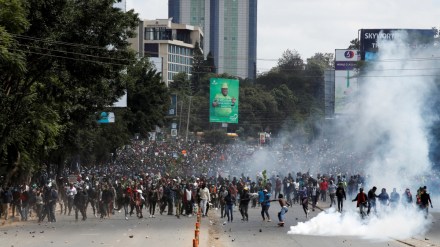A day after the Biden administration recognized Kenya as a major non-NATO ally, the capital city of Nairobi witnessed violent protests as demonstrators stormed Parliament over a contentious finance bill. The protests left several people injured and one person dead, marking a significant escalation in the nation’s political unrest.
Crackdown on Protests
Kenyan police reacted to the across the country dissents strongly. Reportedly, live rounds, rubber bullets and tear gas were used to disperse crowds.
Thousands of demonstrators, primarily youth, took to the streets to rally against a government bill proposing tax hikes. Despite the widespread opposition and a general strike, Kenya’s Parliament passed a second reading of the finance legislation, prompting clashes between riot police and protesters.
This marked the third round of protests in the country, with two fatalities reported last week—one from a gunshot wound and another from a tear gas canister. Unconfirmed reports from Reuters and The Associated Press indicated that police fired live rounds as protesters attempted to approach the Parliament building.
Human Rights Concerns
The Kenya Human Rights Commission condemned the police’s actions, sharing videos of officers shooting at protesters. In a message directed at President William Ruto on social media platform X, the commission stated: “The world is watching your descent into tyranny! Your regime’s actions are an assault on democracy. All those involved in the shooting – actively or passively – must be held to account.”
Roots of the Unrest
The protests, which began last week, have been largely led by young activists angered by the proposed tax hikes. These hikes, the second set of increases in as many years under President Ruto’s administration, have stirred widespread anger due to their impact on essential items like diapers and sanitary towels. The finance bill, once ratified by Parliament, will be sent to President Ruto, who will have 14 days to sign it into law. Last year, he signed a similar tax hike bill immediately.
Government Response
On Tuesday, armed security forces backed by armoured vehicles formed multiple layers of protection around the Parliament building. Amid calls for President Ruto’s resignation, police units secured the presidential building and blocked demonstrators from reaching it. Despite his earlier praise for peaceful protests, President Ruto’s administration faced criticism for the harsh crackdown.
President Ruto had previously commended protesters for their peaceful demonstrations and promised government engagement. However, amendments to the finance bill, which removed some of the more stringent proposals such as a bread tax, have failed to placate the protesters.
The violent protests in Kenya highlight the deepening discontent among citizens over economic policies perceived as burdensome. As the government moves forward with its finance bill, the response from both the public and law enforcement will be crucial in determining the country’s political stability.
